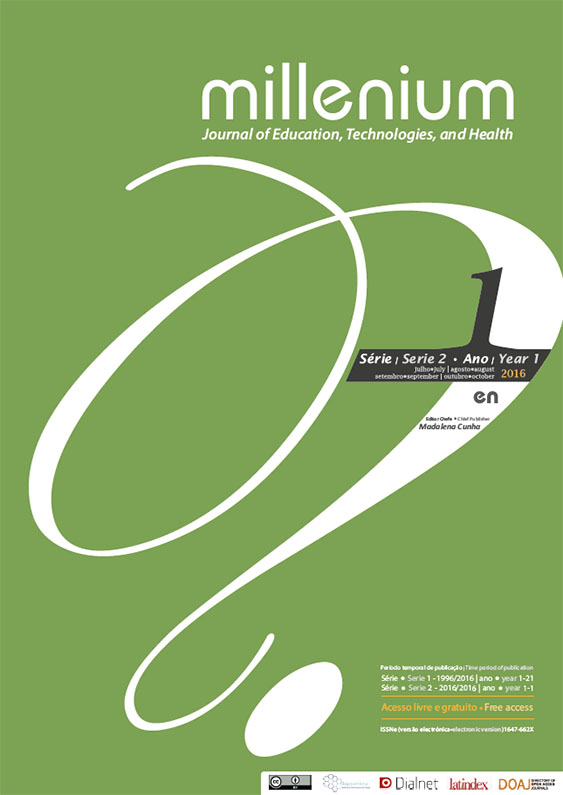Fundamentos de la acción ética en los estudiantes de educación superior
DOI:
https://doi.org/10.29352/mill0201.12.00048Palabras clave:
ethical principles, morality, acting, higher education, studentsResumen
Introducción: Insta a la educación superior en salud a desarrollar en los estudiantes un compromiso ético-moral proactivo y valores socioprofesionales, promotores de una cultura de proximidad que fomenta sentimientos de ciudadanía activa, creativa de enlaces de pertenencia.
Objetivos: Evaluar los fundamentos éticos que apoyan la moralidad de las acciones en los estudiantes de educación superior. Métodos: Estudio descriptivo transversal, realizado con 345 estudiantes del IPV, 80% mujeres, con una edad media de 20.82 años. Se ha aplicado el “Questionário de Cidadania Ativa e Modo de Agir Ético” (CiAMAE) de Cunha (2015).
Resultados: 74.8% de los estudiantes reveló un modo de actuación ético, positiva/adecuada (con el 45.8% adecuado y el 29% muy adecuado) y el 25.2% un modo de actuación éticamente inadecuado. La moralidad de las acciones de los estudiantes se centraron en el individualismo y en base a los siguientes principios éticos: 68.7% el Subjetivismo Ético (69.1% ♂ y 68.6%♀); el Relativismo 56.5% (56.5%♂ y 56.7%♀); 53.9% Ética Deontológica (55.8%♂ y ♀47.0%); 11.3% el Subjetivismo/el Egoísmo Ético (7.4%♂ y 12.3%♀).
Conclusiones: La mayoría de los estudiantes no utilizan el examen imparcial del bien. La mayoría de ellos expresaron aceptar una perspeciva ética subjetivista. Por el contrario, la aplicación del criterio de imparcialidad ética sería considerar el bien supremo en que cualquier estudiante inteligente elegiría para sí mismos y los demás, este supremo bien universal.
Descargas
Citas
Araújo, S. (2008). Contributos para uma educação para a cidadania (17ª ed.). Lisboa: Alto-Comissariado para a Imigração e Diálogo Intercultural. Retrieved from http://www.om.acm.gov.pt/documents/58428/179891/tese_17.pdf/eb3c4d34-e215-46f2-9799-8a2e295070a6
Barata, A. (2008). Agir por dever e ética formal. Covilhã: LusoSofia.
Battestin, C., Bergamo, E., & Gazzola, J. (2016). O filosofar na dimensão e no mundo ético: Confluências com a educação. Revista Teias, 17 (47), 191-205. Retrieved from http://www.periodicos.proped.pro.br/index.php/revistateias/article/view/1906/1468
Cho, Y., & Chi, E. (2015). A comparison of attitudes related to global citizenship between Korean-andUs- educated Korean university students. Asia Pacific Journal of Education, 35(2), 213-225. Retrieved from https://eric.ed.gov/?q=author%3Ayoung&ff1=subStudent+Attitudes&ff2=dtyIn_2015&id=EJ1068710
Cordeiro, A. (2012). Cidadania, democracia e sociedade de comunicação (Dissertação de mestrado, Universidade da Beira Interior). Retrieved from http://ubibliorum.ubi.pt/handle/10400.6/2826
Cunha, M. (2015). Questionário de cidadania ativa e modo de agir ético em estudantes do ensino superior (CiAMAE) - Grupos de corte relativos ao agir ético. Não publicado.
Cunha, M., Albuquerque, C., Dias, A., Aparício, G., Bica, I., André, S., … 25º Curso de Licenciatura em Enfermagem. (2015, March). Ethical/moral knowledge in nursing students. In Proceedings of INTED2015: Conference (pp. 7382-7385). Retrieved from http://repositorio.ipv.pt/handle/10400.19/2675
Fonseca, E. (2014). Nos interstícios da cidadania: A inevitabilidade e urgência da dimensão da virtude cívica na educação. Educaçãoe Pesquisa, 40(1), 181-196. Retrieved from http://www.revistas.usp.br/ep/article/view/81905
Nunes, L. (2016). Os limites do agir ético no dia-a-dia do enfermeiro. Servir, 59 (2), 7-17.
Pires, A. (2007). Educação e cidadania: Consciência nacional no contexto europeu. Revista Portuguesa de Pedagogia, 41(1), 23-39. Retrieved from http://iduc.uc.pt/index.php/rppedagogia/article/view/1183/631
Santos, P., Silva, M., & Guedes, A. (2011). O voluntariado como elemento de aprendizagem e de empregabilidade. Lisboa: Corpo Nacional de Escutas – Escutismo Católico Português. Retrieved from http://www.aev2011.cne-escutismo.pt/PDF/Voluntariado/O%20VOLUNTARIADO%20COMO%20ELEMENTO%20DE%20APRENDIZAGEM.pdf
Vasconcelos, T. (2007). A importância da educação na construção da cidadania. Saber(e) Educar, 12, 109-117. Retrieved from http://repositorio.esepf.pt/handle/20.500.11796/714
Descargas
Cómo citar
Número
Sección
Licencia
Los autores que sometan propuestas para esta revista estarán de acuerdo con los siguientes términos:
a) Los artículos serán publicados según la licencia Licença Creative Commons (CC BY 4.0), conforme el régimen open-access, sin cualquier coste para el autor o para el lector.
b) Los autores conservan los derechos de autor y conceden a la revista el derecho de la primera publicación, se permite la divulgación libre del trabajo, desde que sea correctamente atribuida la autoría y la publicación inicial en esta revista.
c) Los autores están autorización para firmar contratos adicionales separadamente, para la distribución no exclusiva de la versión del trabajo publicada en esta revista (ej.: publicar en un repositorio institucional o como capítulo de un libro), con reconocimiento de la autoría y publicación inicial e esta revista.
d) Los autores tienen permiso y son alentados a publicar y distribuir su trabajo on-line (ej.: en repositorios instituciones o en su página personal) ya que eso podrá generar alteraciones productivas, así como aumentar el impacto y la citación del trabajo publicado.
Documentos necesarios para la sumisión
Plantilla del artículo (formato editable)





